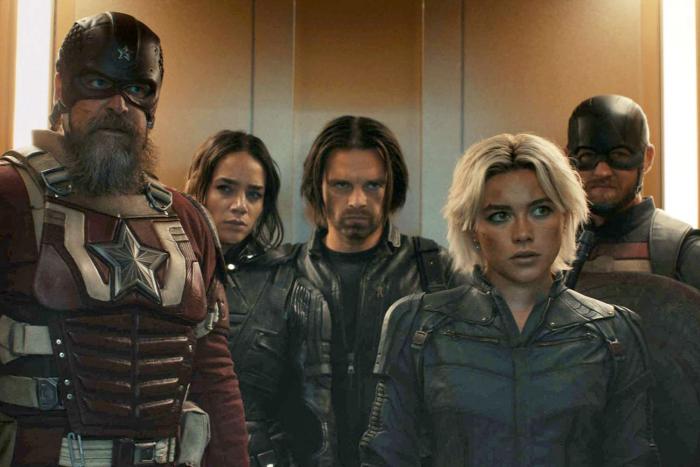By TK Burton | Film | May 4, 2025

The MCU is dying, and I don’t just mean due to some new cosmic threat. It’s been dying a slow, gasping death for the past three years as it continues to struggle to find its footing in the post-Infinity War world. Whether that’s due to superhero overload (probably), Kevin Feige’s hubris (probably again) or a simple decline in the quality and consistency of its products (almost definitely), there’s no question that Marvel’s quest to find its next big thing has been an uphill battle. Throw in the complications that come with their next big bad essentially exiting the MCU altogether (Jonathan Majors’ Kang), and we’re in rough waters here.
It’s ironic then that its possible salvation comes at the hands of its B-team of antiheroes that make up the newest film, Thunderbolts*. Truly a motley crew of rejects and losers, this begrudging team showed up at both the right time for the MCU and the right time in the MCU storyline. Unlike most of the previous films about good guys gaining powers and becoming better guys, Thunderbolts* is about bad guys with powers finally learning to be good. It’s a film about doing the right thing for the right reasons and learning why you do those things. These characters — Yelena Belova (Florence Pugh), Red Guardian (David Harbour), Ghost (Hannah John-Kamen), and John Walker AKA US Agent (Wyatt Russell) are in many ways the dregs of the MCU — castoff, forgotten villains and antiheroes who, other than Pugh and Sebastian Stan’s Bucky Barnes, we probably weren’t expecting to see again.
Yet somehow, throwing them all together to face a mysterious threat called Sentry, a monstrous accident created at the hands of the mysterious and hilarious Valentina Allegra De Fontaine (flawlessly played by Julia Louis-Dreyfus) pays off in ways the recent big-name films have failed to. Thunderbolts* is good, and not just by the sometimes low bar that we judge our popcorn films. Its emotions feel genuine, its heroes’ journeys are often tragic and sad, and their growth into both whole people and a functioning team feels organic and complex. Pugh leads the way with a charged, vulnerable-yet-vicious performance as the reluctant, driftless assassin, but everyone is pulling their weight here.
Interestingly, the action is slightly sparse here. It’s there, don’t get me wrong, and it’s great. The fight choreography is terrific, and director Jake Schreier (Robot & Frank) proves his mettle by giving us some wild scenes, and the actors and stunts all combine for some thrilling moments. Yet it’s the character scenes that sell Thunderbolts*, and their interplay — whether comedic, physical, or emotional — that anchors the film. When we add in the strange x-factor of sort-of-amnesiac Bob Reynolds, a recovering meth addict with a history of mental illness who somehow falls into their laps (and is portrayed wonderfully by Lewis Pullman, the film achieves a bizarrely effective chemistry that we haven’t seen the likes of in years.
Who knows what the future of the MCU is. We’ve got alternate dimensions and mutants and the Fantastic Four all getting whisked into this already unstable and unpredictable recipe, and sometimes it feels like the bigger it gets, the more it stumbles. Yet if the future of this universe is more products like Thunderbolts*, then you know what? This haphazard collection of misfits and maniacs might just restore my faith.